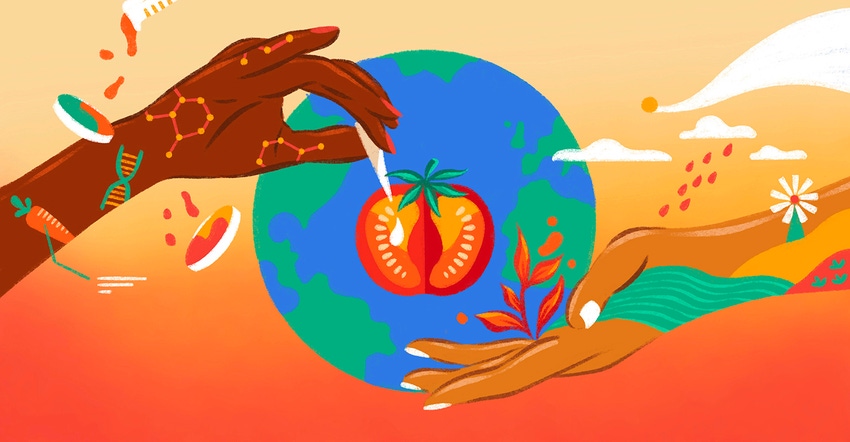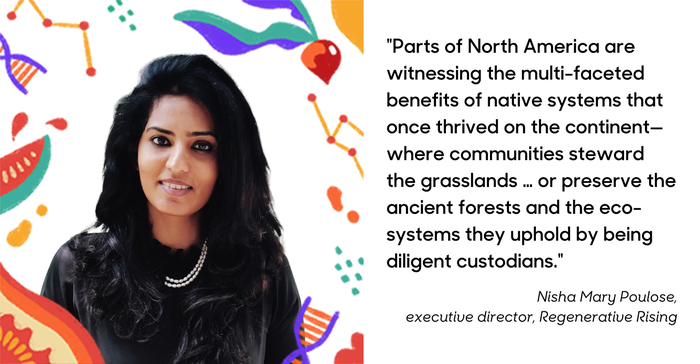The Future of Food: Community links the past and future of regenerative agriculture
Nisha Mary Poulose, executive director of Regenerative Rising, explores why the future of food must lie in ecosystemic communities, where human stewardship regains its rightful place in bioregional culture.

New Hope Network encourages its community members to share open and transparent dialogue about issues that are impacting the food industry and its future. Please help us keep this conversation going. If you’re interested in sharing your opinions on the future of food, email Jessica Rubino at [email protected]. All opinions are welcome.
There is certainly hope for a healthy food system. An overwhelming amount of evidence points to the urgent need to abandon industrial and chemical-dependent agriculture and revert to more earth-friendly practices. Regenerative agriculture is an exciting and attractive alternative that promises to decompartmentalize the system and be both the product and the process of the transformation we desire.
Farming methodologies are under scrutiny and developing frameworks to guide the transition is a hot topic. Soil health, grazing practices, biodiversity, and no-till are a few of the keywords of the day. As we grapple with the challenges of finding our way out of the convoluted, elitist and top-down way of food production, that uses top-tier profit as its North Star, we also seek ways of bringing back the culture of wholesomeness, interdependency and sovereignty into food growing. In a world order established by colonialism and then corporate globalization, this transition necessitates that we listen, observe and learn from both ecological and human communities. Possibly, the most significant challenge in regaining a regenerative food system is in finding ways to cede autonomy of food growing back to the farmer and the community and empower grassroots cooperation and engaged colloquy.

In the Southwestern corner of India lies Kerala, where the idea of a ‘Parambu’ is a part. of the collective psyche. ‘Daaddaa'/'Emeriyaa’ is a dear concept in the Dawro region of Ethiopia. Javanese communities hold the ‘Pekarangan’ as an integral cultural component. While all these loosely translate to ‘home/backyard garden,’ it does not. accurately describe the ancestral system of agroecology that they stand for. Indigenous food growing strategies were part of most cultures, stewarded by communities in some cases and owned by families in others. Take the ‘Milpa’ cycle-based Maya Fores gardens, or the ‘Quesungual’ system from Meso America—these principles of agroforestry are part of cultures that consider Mother Nature an ally. With indigenous communities regaining their voice, parts of North America are now witnessing the multi-faceted benefits of native systems that once thrived on the continent. Where communities steward the grasslands and develop a profoundly collaborative relationship with bison, or preserve the ancient forests and the eco-systems they uphold by being diligent custodians.
These are all locally conceived ways of regenerative food systems, nurtured by families and communities. Whether in the scale of a plot or a region, these systems see plants and animals develop a deeply mutualistic relationship, and dance to the ebb and flow of the seasons, carefully stewarded by human communities. They require very little input and yield bountiful food, fuel, and natural medicine, with a plethora of choices for the family, the community, and the livestock, yet leaving plenty left over for wilderness. It plays a significant role in regulating microclimate and water systems, supporting biodiversity and creating a protective buffer for human homes, while integrally being tied to bioregional sanctity. What is most interesting, is the role it plays in food sovereignty and community building, ensuring that food systems are grounded in the local, serving the community that nurtures it, inculcating a culture of stewardship, and extending liberty and quality of life that is hard to imagine today.
Such a system is not an independent and individualistic effort, it requires collaboration at an eco-systemic level between human and non-human communities. Resilience is another enormous benefit that we enjoy from regenerative agriculture, and here adaptability and autonomy are critical. Regeneration, as a concept, is as old as the Earth itself and has been an intuitive and innate part of indigenous and ancient communities in every corner of the world. Food seems to be a perfect starting point, to find our way back into the natural system, to comprehend reverberant complexity.
The future of food must lie in community: Ecosystemic communities, where human stewardship regains its rightful place in bioregional culture. Certainly, times have changed, and global systems and technology are here to stay. What we need is cooperative and coordinated action pathways between various human communities, with the Earth's systems, using technology and finding a balance between luxury and excess.
Nisha Mary Poulose is the executive director of Regenerative Rising, a women-led nonprofit devoted to elevating and forwarding regenerative principles that expand the capability of people to lead from a living systems worldview.

To purchase a Virtual Conference Experience or add the upgrade to an Exhibit Hall Pass or Exhibitor badge, visit the registration page.
About the Author(s)
You May Also Like




